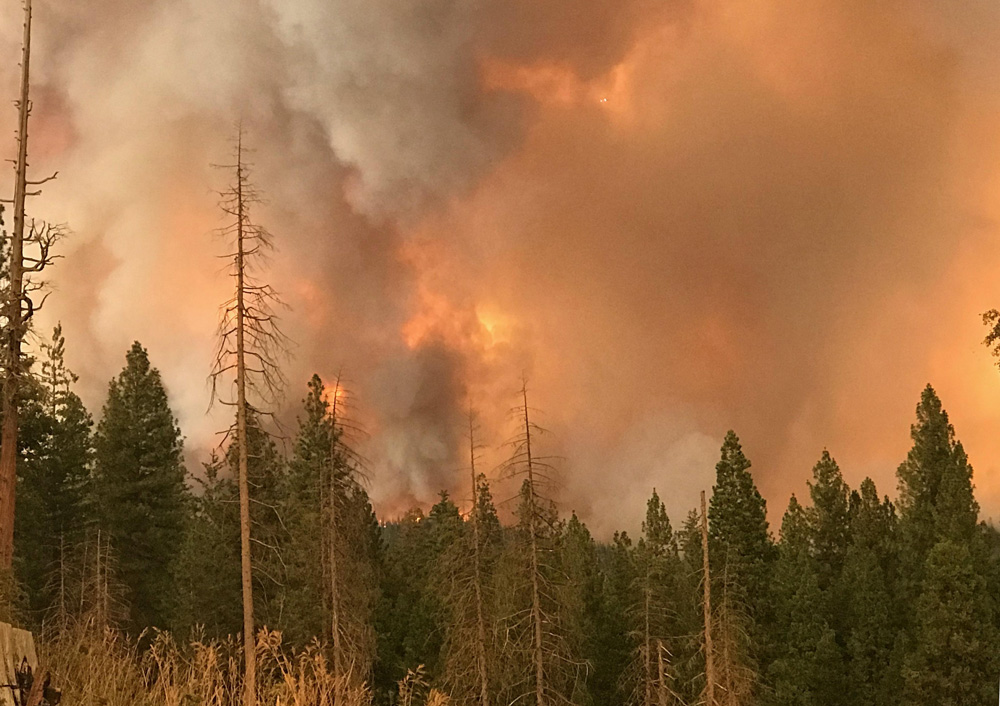
2018 Ferguson Fire in Mariposa County
Photo credit: USDA
July 20, 2021 - Wildfire smoke contains a complex mixture of air pollutants – is unhealthy to breathe and can be especially dangerous for the elderly, pregnant women, and people with chronic respiratory and heart conditions. Infants and children are also at a higher risk as they breathe more air per pound of body weight than adults, and wildfire smoke can irritate their still-developing lungs. Pets also can be affected by unhealthy air and should be brought indoors, if possible.
There are several steps you can take now to keep your family safe before and during wildfire season.
Pay attention to local air quality reports. As smoke gets worse, the concentration of particles in the air increases – and so should the steps you take to protect yourself. Air quality reports are available by visiting the AirNow Fire and Smoke Map or the U.S. Forest Service Wildland Fire Air Quality Response Program
Use common sense to guide your activities. Even if you don’t have a monitor in your area, if it looks or smells smoky outside, it’s probably not a good time to mow the lawn or go for a run. It’s also not a good time for children – especially children with asthma – to be vigorously active outdoors, or active outdoors for prolonged periods of time. If you are active outdoors, pay attention to symptoms, which could be an indication that you need to reduce exposure.
Dust masks and surgical masks aren’t enough! While cloth face coverings offer protection against COVID-19, they do not provide protection against smoke particles. People who must be outdoors in areas with heavy smoke or where ash is disturbed may want to wear a NIOSH-certified N95 respirator mask. Those with existing respiratory, lung or heart conditions should limit their exposure by staying indoors. Since wearing a respirator can make it harder to breathe, those with lung or heart conditions should consult their doctor.
If you are advised to stay indoors, take steps to keep indoor air as clean as possible. Keep your windows and doors closed except in extreme heat. Run your air conditioner if possible. Keep the filter clean to prevent bringing additional smoke inside. Open windows to air out the house when air quality improves. Note: If you don’t have an air conditioner, staying inside with the windows closed may be dangerous in extremely hot weather. In these cases, seek alternative shelter, such as with relatives or a cleaner air shelter.
Help keep particle levels inside lower. When smoke is heavy for a prolonged period, fine particles can build up indoors even though you may not be able to see them. Try to avoid using anything that burns, such as wood fireplaces, gas logs, gas stoves – and even candles. Avoid using your vacuum, which can stir up particles already inside your home.
If you have asthma or another lung disease, make sure you follow your healthcare provider’s directions about taking your medicines and following your asthma action plan. Have at least a five-day supply of medication on hand. Call your healthcare provider if your symptoms worsen.
If you have cardiovascular disease, follow your healthcare provider’s directions and call if your symptoms worsen. If you think you are having a heart attack or stroke, dial 9-1-1.
To build a temporary box fan air filter follow this instructional video
For more information on protecting yourself from wildfire smoke, visit: https://ww2.arb.ca.gov/protecting-yourself-wildfire-smoke
Source: Cal OES
